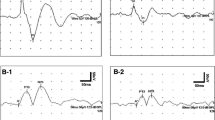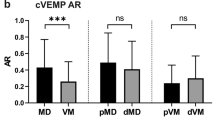Abstract
Sound-induced vestibular-evoked myogenic potentials (VEMPs) can be used to investigate saccular function, measured from the tonically contracted sternocleidomastoid muscles (SCM) in response to loud sound stimuli. The aim of the present study was to assess VEMPs in patients with vestibular migraine and to determine whether saccular function is affected by the disease. Furthermore, tests such as tilts of subjective visual vertical (SVV) and caloric testing were conducted to test whether deficits in the various tests are associated with each other. The amplitude and latency of VEMPs were measured from the SCM in 63 patients with vestibular migraine (median age 47 years; range 24–70 years) and compared with those of 63 sex- and age-matched healthy controls (median age 46 years; range 17–73 years). Of the 63 patients with vestibular migraine, 43 (68%) had reduced EMG-corrected VEMP amplitudes compared to the controls. Thus, the mean of the p13–n23 amplitudes of the vestibular migraine patients were 1.22 (SE ±0.09) for the right and 1.21 (SE ±0.09) for the left side, whereas the averaged amplitudes of the 63 healthy controls showed a mean of 1.79 (SE ±0.09) on the right and of 1.76 (SE ±0.09) on the left. No difference was seen in the latencies and there was no correlation between VEMP amplitudes, tilts of SVV and caloric testing. Our data on patients with vestibular migraine indicate that the VEMP amplitudes are significantly and bilaterally reduced compared to those of controls. This electrophysiological finding suggests that both peripheral vestibular structures, such as the saccule, but also central vestibular structures are affected. Thus, beside the brainstem, structures in the inner ear also seem to contribute to vertigo in vestibular migraine.



Similar content being viewed by others
References
Akkuzu G, Akkuzu B, Ozluoglu LN (2006) Vestibular evoked myogenic potentials in benign paroxysmal positional vertigo and Meniere’s disease. Eur Arch Otorhinolaryngol 263:510–517
Allena M, Magis D, De Pasqua V, Schoenen J (2007) The vestibulo-collic reflex is abnormal in migraine. Cephalalgia 27:1150–1155
Aw ST, Todd MJ, Aw GE, Weber KP, Halmagyi GM (2008) Gentamicin vestibulotoxicity impairs human electrically evoked vestibulo-ocular reflex. Neurology 71:1776–1782
Brandt T (2004) A chameleon among the episodic vertigo syndromes: ‘migrainous vertigo’ or ‘vestibular migraine’. Cephalalgia 24:81–82
Brantberg K, Bergenius J, Tribukait A (1999) Vestibular-evoked myogenic potentials in patients with dehiscence of the superior semicircular canal. Acta Otolaryngol 119:633–640
Buzzi G, Moskowitz MA (2005) The pathophysiology of migraine: year 2005. J Headache Pain 6:105–111
Celebisoy N, Gökçay F, Sirin H, Biçak N (2008) Migrainous vertigo: clinical, oculographic and posturographic findings. Cephalalgia 28:72–77
Chen CW, Young YH, Wu CH (2000) Vestibular neuritis: three-dimensional videonystagmography and vestibular evoked myogenic potential results. Acta Otolaryngol 120:845–848
Chen CH, Young YH (2003) Vestibular evoked myogenic potentials in brainstem stroke. Laryngoscope 113:990–993
Cutrer FM, Baloh RW (1992) Migraine-associated dizziness. Headache 32:300–304
Cutrer FM, Sorensen AG, Weisskoff RM et al (1998) Perfusion-weighted imaging defects during spontaneous migrainous aura. Ann Neurol 43:25–31
De Waele C, Tran Ba Huy P, Diard JP et al (1999) Saccular dysfunction in Menière’s patients: a vestibular-evoked myogenic potential study. Ann N Y Acad Sci 871:392–397
Dichgans J, Held R, Young LR, Brandt T (1972) Moving visual scenes influence the apparent direction of gravity. Science 178:1217–1219
Dieterich M, Brandt T (1993) Ocular torsion and tilt of subjective visual vertical are sensitive brainstem signs. Ann Neurol 33:292–299
Dieterich M, Brandt T (1999) Episodic vertigo related to migraine (90 cases): vestibular migraine? J Neurol 246:883–892
Dreier JP, Korner K, Ebert N et al (1998) Nitric oxide scavenging by hemoglobin or nitric oxide synthase inhibition by N-nitro-l-arginine induces cortical spreading ischemia when K+ is increased in the subarachnoid space. J Cereb Blood Flow Metab 18:978–990
Furman JM, Marcus DA, Balaban CD (2003) Migrainous vertigo: development of a pathogenetic model and structured diagnostic interview. Curr Opin Neurol 16:5–13
Hadjikhani N, Sanchez del Rio M, Wu O et al (2001) Mechanisms of migraine aura revealed by functional MRI in human visual cortex. Proc Natl Acad Sci 98:4687–4692
Hamel E (2007) Serotonin and migraine: biology and clinical implications. Cephalalgia 27:1295–1300
Held R, Dichgans J, Bauer J (1975) Characteristics of moving visual scenes influencing spatial orientation. Vision Res 15:357–365
Honrubia V (1994) Quantitative vestibular function tests and the clinical examination. In: Herdmann SJ (ed) Vestibular rehabilitation. Davis, Philadelphia, pp 113–164
International classification of headache disorders (2004), 2nd edn. Cephalalgia 24:9–160
Koo J-W, Balaban CD (2006) Serotonin induced plasma extravasation in the murine inner ear: possible mechanisms of migraine-associated inner ear dysfunction. Cephalalgia 26:1310–1319
Li M, Ding D, Zheng XY, Salvi R (2004) Vestibular destruction by slow infusion of gentamicin into semicircular canals. Acta Otolaryngol Suppl 552:35–41
Liao LJ, Young YH (2004) Vestibular evoked myogenic potentials in basilar artery migraine. Laryngoscope 114:1305–1309
Lim CL, Clouston P, Sheean G, Yiannikas C (1995) The influence of voluntary EMG activity and click intensity on the vestibular click evoked myogenic potential. Muscle Nerve 18:1210–1213
Lin M-Y, Timmer F, Oriel B et al (2006) Vestibular evoked myogenic potentials (VEMP) can detect asymptomatic saccular hydrops. Laryngoscope 116:987–992
Matsuzaki M, Murofushi T (2001) Vestibular evoked myogenic potentials in patients with idiopathic bilateral vestibulopathy. Report of three cases. ORL J Otorhinolaryngol Relat Spec 63:349–352
McCue MP, Guinan JJ Jr (1994) Influence of efferent stimulation on acoustically responsive vestibular afferents in the cat. J Neurosci 14:6071–6083
Minor LB, Solomon D, Zinreich JS, Zee DS (1998) Sound-and/or pressure induced vertigo due to bone dehiscence of the superior semicircular canal. Arch Otolaryngol Head Neck Surg 124:249–258
Murofushi T, Matsuzaki M, Mizuno M (1998) Vestibular evoked myogenic potentials in patients with acoustic neuromas. Arch Otolaryngol Head Neck Surg 124:509–512
Murofushi T, Matsuzaki M, Takegoshi H (2001) Glycerol affects vestibular evoked myogenic potentials in Meniere’s disease. Auris Nasus Larynx 28:205–208
Neuhauser H, Leopold M, von Brevern M, Arnold G, Lempert T (2001) The interrelations of migraine, vertigo, and migrainous vertigo. Neurology 56:436–441
Neuhauser H, Lempert T (2004) Vertigo and dizziness related to migraine: a diagnostic challenge. Cephalalgia 24:83–91
Ochi K, Ohashi T, Watanabe S (2003) Vestibular-evoked myogenic potential in patients with unilateral vestibular neuritis: abnormal VEMP and its recovery. J Laryngol Otol 117:104–108
Radke A, Lempert T, Gretsty MA et al (2002) Migraine and Menière’s disease—is there a link? Neurology 59:1700–1704
Rauch SD (2006) Vestibular evoked myogenic potentials. Curr Opin Otolaryngol Head Neck Surg 14:299–304
Shimizu K, Murofushi T, Sakurai M, Halmagyi GM (2000) Vestibular evoked myogenic potentials in multiple sclerosis. J Neurol Neurosurg Psychiatry 69:276–277
Stahl JS, Daroff RB (2001) Time for more attention to migrainous vertigo? Neurology 56:428–429
Takeichi N, Sakamoto T, Fukuda S, Inuyama Y (2001) Vestibular evoked myogenic potential (VEMP) in patients with acoustic neuromas. Auris Nasus Larynx 28(Suppl):S39–S41
Tal D, Hershkovitz D, Kaminski G, Bar R (2006) Vestibular evoked myogenic potential threshold and seasickness susceptibility. J Vestib Res 16:273–278
Tal D, Gilbey P, Bar R, Shupak A (2007) Seasickness pathogenesis and the otolithic organs: vestibular evoked myogenic potentials study—preliminary results. Isr Med Assoc J 9:641–644
Tu CE, Young Y-H (2004) Audiovestibular evolution in a patient with multiple sclerosis. Ann Otol Rhinol Laryngol 113:726–729
von Brevern M, Zeise D, Neuhauser H et al (2005) Acute migrainous vertigo: clinical and oculographic findings. Brain 128:365–374
Welgampola MS, Colebatch JG (2005) Characteristics and clinical applications of vestibular-evoked myogenic potentials. Neurology 64:1682–1688
Young YH, Huang TW, Cheng PW (2003) Assessing the stage of Meniere’s disease using vestibular evoked myogenic potentials. Arch Otolaryngol Head Neck Surg 129:815–818
Zhou G, Cox LC (2004) Vestibular evoked myogenic potentials: history and overview. Am J Audiol 13:135–143
Acknowledgments
This study was supported by the Stiftung Rheinland-Pfalz für Innovation. We are grateful to thank Ms Benson for critically reading the manuscript.
Author information
Authors and Affiliations
Corresponding author
Rights and permissions
About this article
Cite this article
Baier, B., Stieber, N. & Dieterich, M. Vestibular-evoked myogenic potentials in vestibular migraine. J Neurol 256, 1447–1454 (2009). https://doi.org/10.1007/s00415-009-5132-4
Received:
Revised:
Accepted:
Published:
Issue Date:
DOI: https://doi.org/10.1007/s00415-009-5132-4




